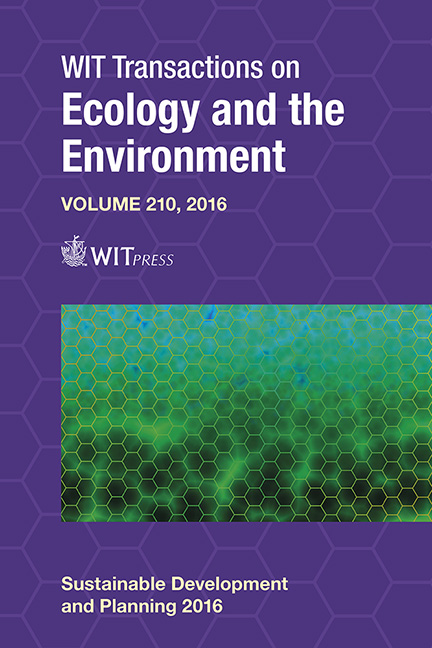Sustainable Project Management In Urban Development Projects: A Case Study Of The Greater Port Harcourt City Development Project In Rivers State, Nigeria
Price
Free (open access)
Transaction
Volume
210
Pages
11
Page Range
209 - 219
Published
2017
Size
380 kb
Paper DOI
10.2495/SDP160181
Copyright
WIT Press
Author(s)
M. W. Jack, A. M. Coles, A. Piterou
Abstract
Sustainable urban development is fundamental to future generations as it determines the longevity of a city. The strategy is about developing an urban area that fulfils the needs of the present generation, protect and preserve the environment for the future generations. Uncontrolled and unregulated urban developments in Nigeria are documented to be some of the major challenges that support unsustainable urban development. Thus, urban decay is stirred by overstretch on existing infrastructures as a result to unprecedented population growth, lack of maintenance due to institutional breakdowns, unauthorised/unregulated construction works, and nonchalant behaviours on the part of the citizens. Sustainable urban development is a convoluted phenomenon that is dependent on several other intricate developmental strategies centric on land/water use, housing, transport, water management, waste management, sanitation, education, healthcare, and energy. These are major developmental aspects of an urban area that can drive sustainable development goals, hence, it is important to critically address the challenges that emanates as a result to the inefficiency around them. As a means to address the challenges of unsustainable urban development, this research is aimed at developing a sustainability framework for the ongoing urban development projects in Port Harcourt, Rivers State, Nigeria. To achieve the aforementioned aim, the objectives are to identify and examine the factors that are hindering the success of the project. The framework will be developed to cover major areas of stakeholders’ concern. Stakeholders opinions were obtained through the collection of qualitative primary data; face to face interviews with 52 stakeholders, non-participant observations of project sites and analysis of project documents. The data set was analysed using thematic analysis. The study revealed that political instability, lack of communication and consultation, nepotism by political officials, lack of standardised project design, lack and failure to adhere to project management regulations, and lack of continuity in government are some of the factors inhibiting the sustainability of the project.
Keywords
urbanisation, urban decay, sustainable development, sustainable urban development, infrastructure, project management, innovation, technology





